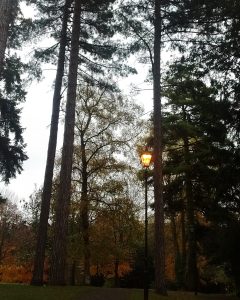This week’s bit of string: Fourteenth century ploughing techniques
Stories are like a box of chocolates; some of us can’t resist the dark ones. I don’t mean dark as in using horror elements, but rather the darker aspects of real life, from brutal struggles and current events.
I sometimes fear that writing ‘dark’ stories may put off readers who seek literary escapism. How do we justify putting serious issues into our work?
Dark stories need tough heroes/heroines to blaze through them. After all, fiction is only as sad as its characters, just as life is only as sad as we feel.
Utilising Juxtaposition
There are so many elements to a story: plot, setting, characters, tone, dialogue… And there can be different degrees of darkness to each element. For example, Catch-22 has a horrific wartime plot, but the tone is humourous. Cruel deeds may unfold against a bright summer setting, as in L’Etranger (one of the bleakest books I’ve ever read).
We don’t use these contrasts to dilute the message. Rather, the idea is to illuminate and emphasise it. Interweaving tragedy with comedy can sharpen it with the shock of the unexpected.

We can create characters that suffer terribly, but perhaps they have a sense of humour about it. We all know people like that in real life.
My first published story, ‘The Meek Inherit,’ portrayed a small snapshot of Haiti’s devastating 2010 earthquake. But I used a fiercely imaginative, independent Haitian girl’s point of view, which imbued it with a sense of hope. Through her, I could bring attention to Haiti’s misfortunes, but also to the resourcefulness of its people. ‘How dull reading would be,’ Robert Burdock commented in his review, ‘if every story had a Disney ending.’
Instigating Change
After I read my story The Apocalypse Alphabet at Stroud Short Stories’ event recently, a couple of very talented writers spoke to me afterwards and described the story as harrowing. I began to apologise, but they said, ‘No, no, it’s important to be harrowed sometimes. If that’s a word!’
Harrowed is a word, as it turns out. The word harrow comes from a medieval Dutch word for rake, and a harrow, thusly, is a spiky tool that pulverises soil before planting. A painful process, no doubt—which then contributes to yielding useful crops.
Good fiction has the power to shake us up, jolt us awake, and change our habits. I can think of two books I’ve read in recent years that have altered my thought patterns. Marina Lewycka’s novel Two Caravans honestly and wittily brings attention to the plight of migrant workers in the UK, including some working under dreadful conditions at a chicken packaging plant. Since reading this novel, I only use free-range chicken products, because it made me realise: companies that mistreat animals for profit will most likely mistreat human workers, as well.
The second book was James Baldwin’s Go Tell It On the Mountain. This tormented, semi-autobiographical book about an adolescent boy desperate to win his religious father’s approval honed my awareness about the legacy of slavery for generation after generation of African Americans. I was struck by the fact that Baldwin’s grandmother had been a slave, and her first children had been taken from her and sold. His writing made me consider the devastating impact this would have on a person’s ability to love and form familial bonds later on—and this would then impact her children, and their children, and so forth.

It’s not easy to be shown the dark underbelly of the bloated, overfed privilege some of us enjoy. But I believe we can learn from it. And fiction is particularly placed to do that, because it opens up our imaginations. Imagination doesn’t merely lead to escapism, it can lead to empathy as well, which as I’ve previously discussed, is the key to changing the world.
So, what books have harrowed you to the point of growing new crops, so to speak? How much dark reality do you find acceptable in a story? Personally, I’m a realist. I like any happy endings to come out of a recognisable version of the world. I love Margaret Atwood’s novel The Blind Assassin, in which a man tells his mistress a tale with various dark twists involving slavery and sacrifice, but sets it against a dazzling background of an ancient city on a distant planet.
His lover whispers, ‘”Why are you telling me such a sad story?”’
‘”I tell you the stories I’m good at,” he says. “Also the ones you’ll believe. You wouldn’t believe sweet nothings, would you?”’
You’ve inspired me to work more darkness into my writing, so that it’s dark and silly instead of just silly.
There’s certainly a place for silliness, to relieve us from the darkness sometimes. But I’d be very interested to see what sort of darkness you can contribute! Perhaps we all have a unique brand of darkness others can learn from–and a unique silliness, too.